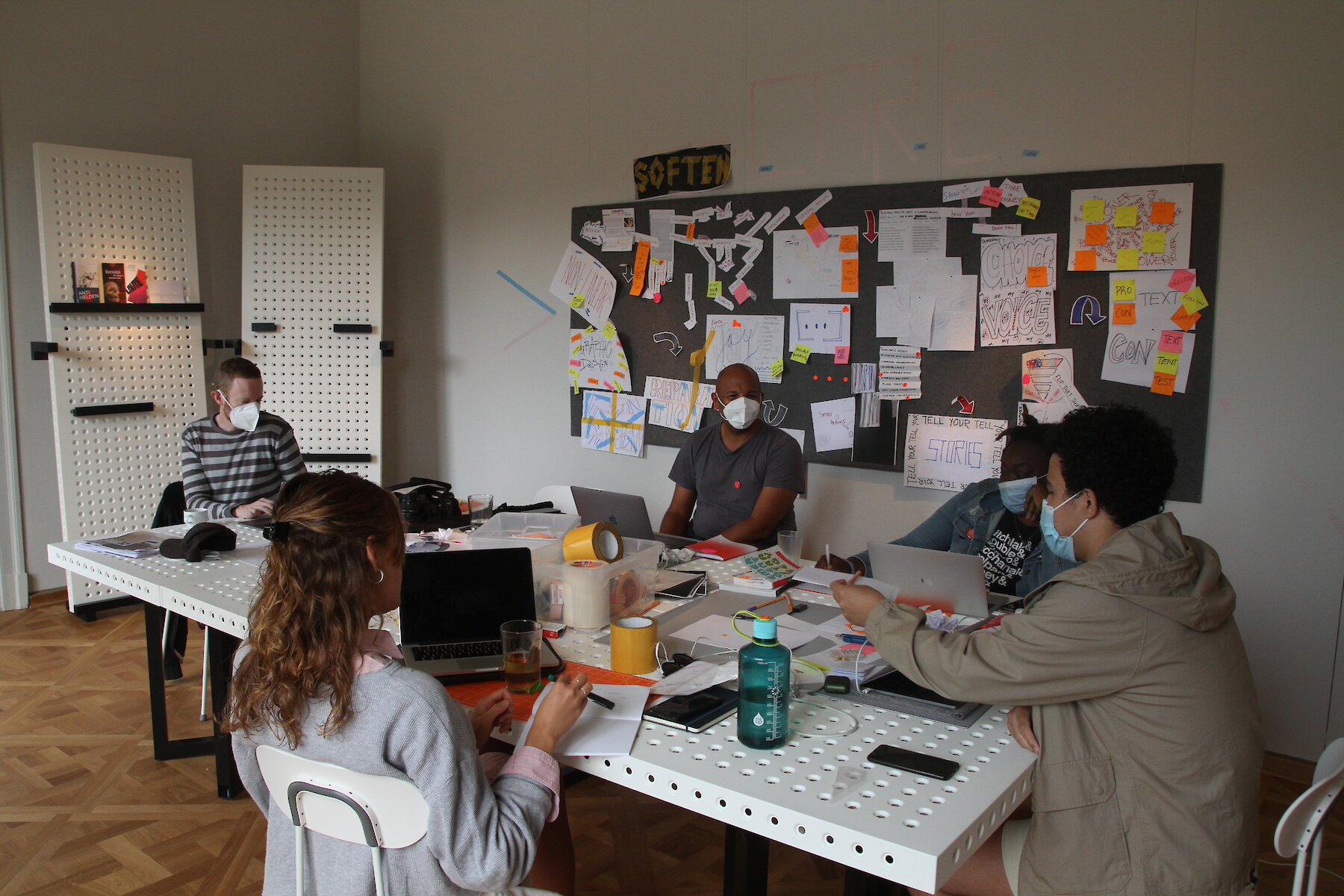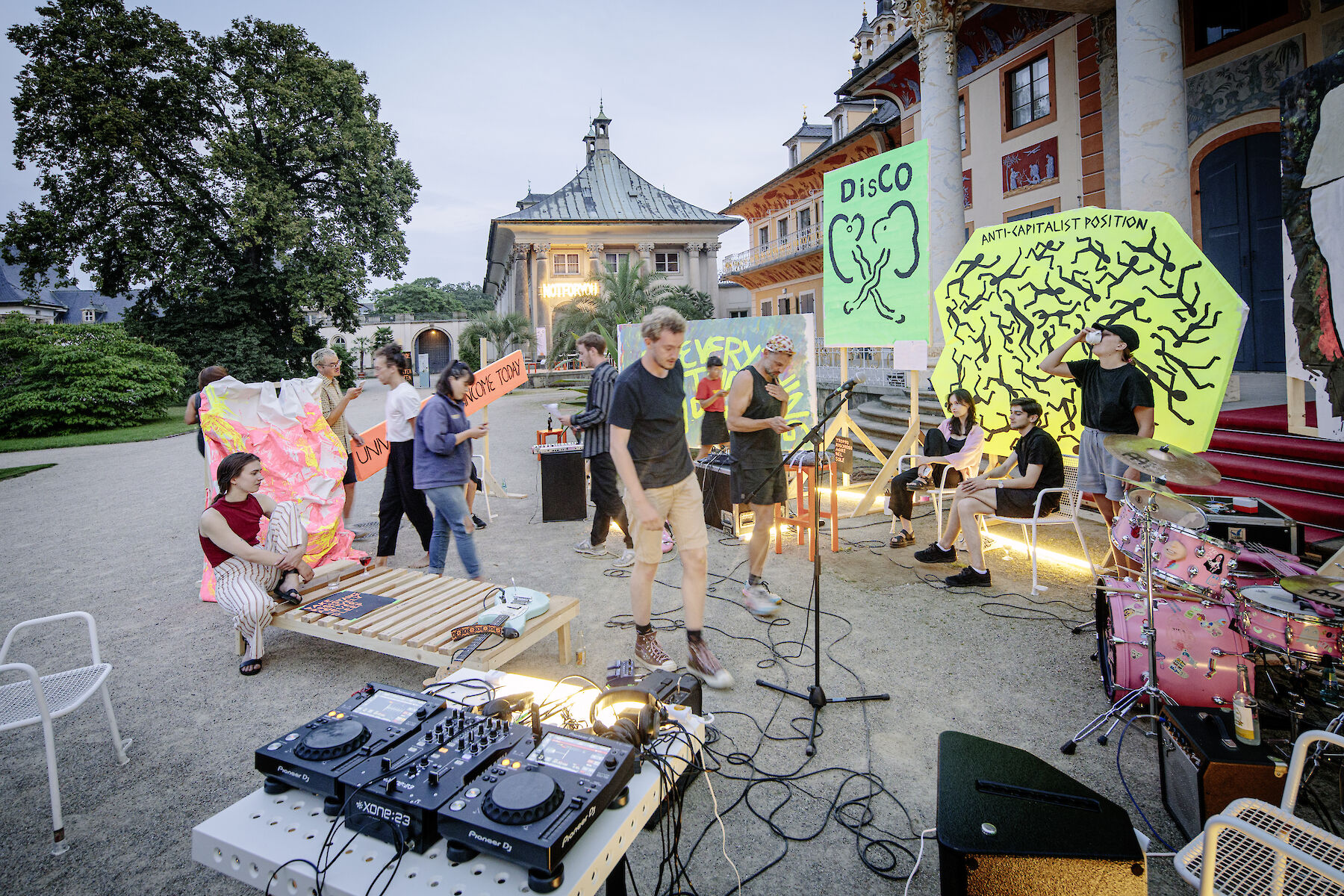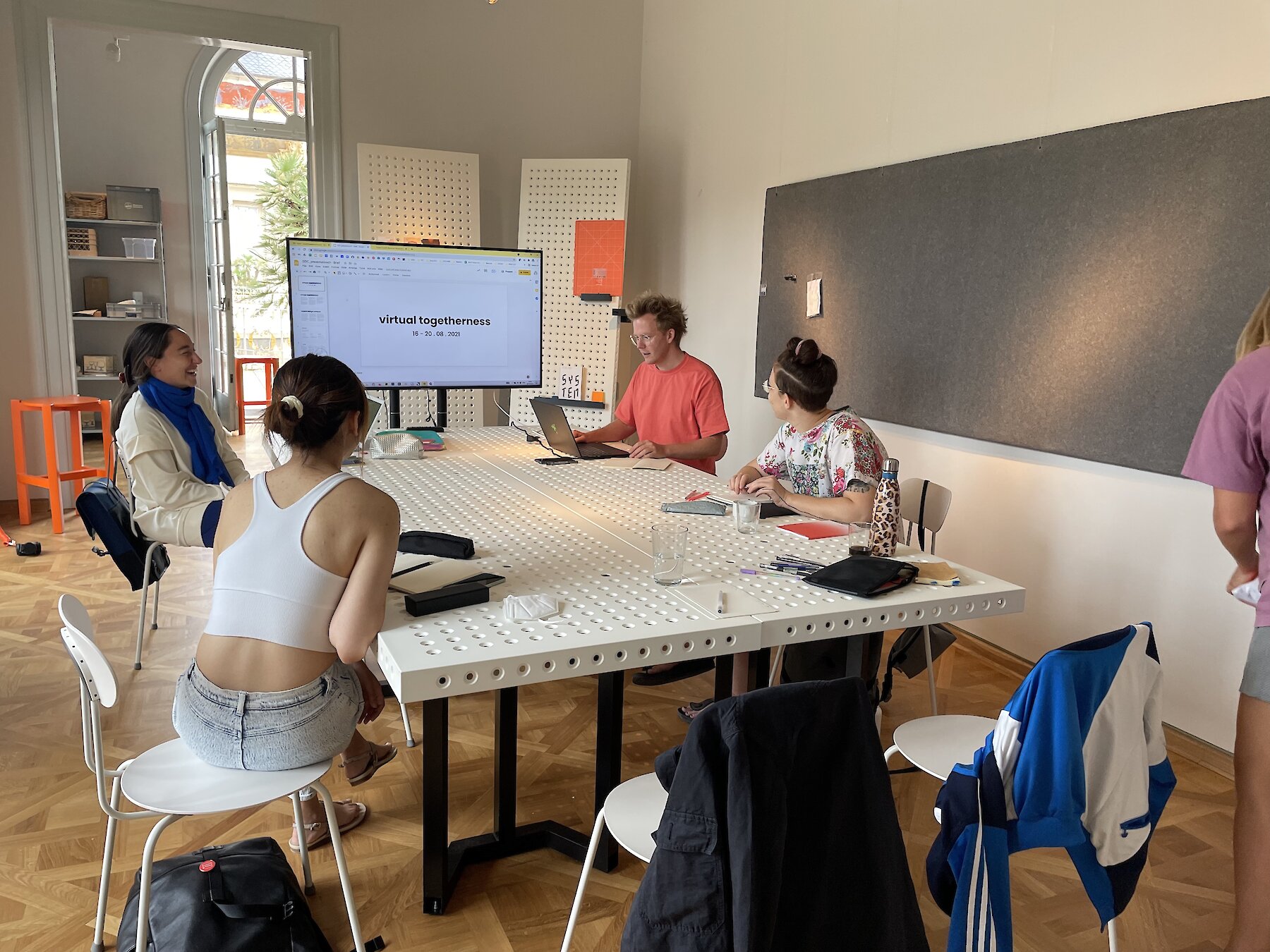Class 2021
Design
& Democracy
The Design Campus summer program is a “School of Utopias”. It is a visionary design school set to explore complex problems, dream bold ideas, and collaboratively build new ways forward. Curated by a different Head of School each year, the curriculum will investigate a specific theme. The students and faculty will explore the research question through a series of workshops, lectures, talks, exhibits, and other public programs. The summer school will be a spring board for future projects in the museum, its environs, and its network.
Class 2021
Design & Democracy:
Renegotiating plurality, power and people
Amelie Klein, Vera Sacchetti
Democracy is under fire: by those who oppose it and by those who have exposed its limitations. The last elections in Europe and the Brexit Referendum have revealed the frailties within our democratic systems. However, the build up to and aftermath of the 2020 USA presidential election have further exposed a fractured system and a deeply divided civic culture. While there are many efforts underway to “heal” it, citizens no longer trust the political system and are retreating from engaging with it. And the system, which is shaped by design, has failed citizens.
The reasons for today’s political crises are as complex, convoluted, and multifarious as their multiple appearances. There is no doubt that design has contributed in multiple ways to the lack of trust in democracy we experience today, from poorly designed ballots causing confusion, to social media echo chambers influencing the distribution of information, and consequently, people's beliefs. Conversely, our current political crises have led policymakers and governmental advisory bodies to question the design and underlying mechanisms of our decision-making processes.
Paramount in these explorations is the Organization for Economic Cooperation and Development’s (OECD) international Innovative Citizen Participation Network, which we have joined as members at the time of its foundation in 2019 and which has notably influenced our thinking about democratic processes and mechanisms. Composed of policymakers, activists, community organizers, members of government, professors and academics and, yes, designers, and design curators, the network explores the impact of deliberative processes in democratic settings all over the world. In our extremely polarized time, the promising approach of a deliberative democratic model, materializing in representative processes such as Citizens’ Assemblies or juries for public decision-making, can give citizens a more permanent and meaningful role in shaping the policies affecting their lives. In its analysis of more than three hundred international case-studies, the OECD has evaluated what a ‘successful’ process entails, developed good practice principles, and explored routes to institutionalizing citizen deliberation.
The use of deliberative processes recalls Classical Antiquity and the Renaissance, and has been used throughout history in a variety of scales, by top-down or bottom-up structures, grassroots movements, but has not been favored since the modern era. As we work across disciplines to question and dismantle the certainties in our present moment, it is important to consider alternatives to implemented systems and the potential of deliberative democratic methods, both of which can be explored and engaged with from a design perspective.
With this understanding, the inaugural summer school of the Design Campus will investigate the many connections between Design and Democracy. The six-week-long program will probe design and its involvement in democratic processes, exhibiting the social and political dimension of the discipline. Simultaneously, the program advocates a broader understanding of design, where the borders between disciplinary silos are blurred and design becomes a tool for translation and mediation. In this way, design is highlighted as an instrumental tool in the unravelling of democracy but also essential for its reconstitution.
With two workshops and several lectures per week, the program is created to explore diverse areas of overlap between design and democracy. Starting with an initial encounter and assessment of complex, multilayered systems formed by polities and policies in the first week, we explore how these can be designed and shaped in designerly ways. The program continues with an investigation of how power structures manifest in physical and virtual ways, both visible and invisible. We will explore issues of choice and empowerment, seeking to understand who gets to choose and why and delve into topics of activism and protest, exploring the myriad of ways to resist and change. The program then investigates matters of solidarity, both embodied and in innovative settings, and concludes with a week of reflection on documenting and archiving the knowledge we share today. Mentored by designers, architects, curators, writers, and other practitioners, participants in the summer school will ultimately sharpen tools which will enablethem to question, reevaluate, and redesign democracy from multiple perspectives.
The Summer School is set to take place in the Baroque Pillnitz Palace, an idyllic estate with an extensive garden next to the Elbe river, in the outskirts of Dresden, Germany. Once the home of mistresses, and later summer residence, of the Saxon royals, the holding is an ensemble of three individual palaces one of which, the Riverside Palace where the workshops take place, is celebrating its 300th anniversary this summer. However, the beauty of the architecture and landscaping shouldn’t divert from the historical realities which enabled such splendor. As Europe’s largest chinoiserie palace complex it is a testament of the continent’s colonial past and its rise to power and wealth at the dire expense of the rest of the world. And even Europe’s population suffered in the wake of a historical meeting at the palace. In August 1791, Frederick William II of Prussia and the Emperor Leopold II of Austria issued the Declaration of Pillnitz declaring their joint support for King Louis XVI of France against the French Revolution, which would ultimately result in slowing the rise of political enfranchisement in Europe. Thus the historical grounds of Pillnitz Palace give cause in multiple ways for scrutinizing the delicate interconnections of people, power and plurality.
Participants in the 2021 Summer School Design and Democracy will have the chance to work with practitioners and educators from all over the world, who have diverse backgrounds but all share the willingness to engage with the trouble of our current times. To ensure a diverse set of opinions, backgrounds, and voices, a scholarship scheme has been established with the Design Campus to break barriers in access for the summer school. Workshop tutors include architects and critical spatial practitioners; designers and design educators; policymakers and urban thinkers; artists and activists. All work in different constellations and across disciplines in a variety of capacities. Together, we will work to question and dissect what is. We will go forward to formulate and test proposals and alternatives for what can be.
Amelie Klein
AMELIE KLEIN is an independent design curator, writer, and critic. Currently, she is working on an exhibition called Heimaten, scheduled to open in June 2021 at the Museum für Kunst und Gewerbe in Hamburg.
Until July 2019, she was a curator at the Vitra Design Museum in Weil am Rhein, Germany, where she was responsible for numerous international traveling exhibitions such as Victor Papanek: The Politics of Design, Hello, Robot. Design between Human and Machine and Making Africa — A Continent of Contemporary Design. In 2015 and 2017, Klein was nominated by the German magazine art for their Curator Prize, awarded for the best exhibition in Germany, Austria, and Switzerland. She received the Richard Schlagman Art Book Award for the exhibition catalogue Victor Papanek: The Politics Of Design. She completed an MFAin Design Criticism at New York’s School of Visual Arts and holds an MBA from the Vienna University of Economics and Business in Austria. For over ten years, Klein worked as an editor and journalist publishing a variety of articles in Die Presse, Abitare, and Metropolis, among others. She is a member of the OECD’s Innovative Citizen Participation Network.

Vera Sacchetti
VERA SACCHETTI is a Basel-based design critic and curator. She serves in a variety of curatorial, research, and editorial roles, most recently as program coordinator for the multidisciplinary research initiative Driving the Human (2020−2023) and curator of the initial edition of architecture festival Archipelago: Architectures for the Multiverse (2021).
She is co-curator of TEOK Basel and one half of the curatorial initiative Foreign Legion. Sacchetti was associate curator of the 4th Istanbul Design Biennial, A School of Schools, curatorial advisor for the BIO50 Biennial of Design in Ljubljana, Slovenia, and, as part of editorial consultancy Superscript, headed the “Towards a New Avant-Garde” event series at the 2014 Venice Architecture Biennale. She has recently edited Design as a Tool for Transition: The Atelier Luma Approach and Design As Learning: A School of Schools Reader. Her writing has appeared in Disegno, Metropolis, and The Avery Review, among others. Sacchetti teaches at ETH Zurich and HEAD Geneva, and in 2020 joined the Federal Design Commission of Switzerland. She is a member of the OECD’s Innovative Citizen Participation Network.

Week 1
18/7 – 24/7/2021
Engaging with the Trouble: (Re-) Designing Complexity
Realists of a Larger Reality: Cities, Political Imagination and Social Creativity
- Gabriella Gomez-Mont (MX)

Shifting Perspective: Informal Living Systems
- Studiolow – Héloïse Charital and Ismaël Rifaï (FR)

Week 2
25/7 – 31/7/2021
Visible and Invisible Barriers: Understanding Power Structures
Interscalar Movement(s)
- Giuditta Vendrame (IT, NL)

Power Building
- David Mulder van der Vegt (NL)

Week 3
1/8 – 7/8/2021
Our Voice, Our Vote: on Choice and Empowerment
Inviting People In Through Many Doors
- Andrew Sloat (US)

Throwing Stuff Under the Bus
- Ramon Tejada (US)

Week 4
8/8 – 14/8/2021
We Will Not Be Silent: on Activism and Protest
Future Realities: Designing New Worlds
- Basma Hamdy (EG)

New World Propaganda
- Jerszy Seymour (CA, UK)

Week 5
15/8 – 21/8/2021
All Together Now: towards Solidarity
Virtual Togetherness
- Space Popular – Lara Lesmes and Fredrik Hellberg (UK)

Solidarity is a Verb.
- Vivien Tauchmann (DE)

Week 6
22/8 – 28/8/2021
Telling the Stories: on Writing, Curating and Sharing
Making a Deliberative Design Museum
- Amelie Klein (AT)
- Vera Sacchetti (PT)

Thinking from, through, with, and against the collection
- Nina Paim (BR)

Design Campus Summer School AT A GLANCE
PROGRAM DURATION
The Summer School comprises of 1-week long workshops, guest lectures, guided tours and other fun activities for the duration of 6-weeks. Check out the program here.
ELIGIBILITY
- Have a demonstrably interest in changing the world through design
- Have a good level of English
- Be 18 years or over
Be curious, restless, dreamer of better places, creative, fearless, social, collaborative, interested, engaged, inquisitive, designer, architect, artist, scientist, curator, journalist, engineer, developer, photographer, filmmaker, skilled students, recent graduates or young-professionals, open-minded people: welcome!
YOU DO NOT NECESSARILY HAVE TO HAVE...
- ... a degree in graphic or product design. Students and graduates from all disciplines are welcome!
- ... experience with Image-editing or Video-editing programs. We welcome a variety of skillsets!
Successful applicants will be contacted directly by E-Mail to proceed with enrollment and tuition payment.
Arrival
By car:
Address: Schloss Pillnitz, August-Böckstiegel-Straße 2, 01326 Dresden.
There are two public (paid) parking facilities at Pillnitz Palace. The dormitory and the premises of the Design Campus in Pillnitz Palace are both within walking distance from the parking facilities.
By train/airplane:
We recommend arriving at the Design Campus by train via Dresden-Neustadt station or Dresden main station. The Design Campus in Pillnitz Palace can be reached from Dresden city centre at any time by public transport (bus stop “Pillnitzer Platz”).
The closest airports to the Design Campus are Dresden Airport (45 min), Leipzig Airport (1,5 h), Prague Airport (2 h) or Berlin Airport (2,5 h). From all airports there are connections to Dresden by public transport (train, bus).
Check-in & Workshops
Check-in is possible on Sunday afternoon from 3 pm to 9 pm. On Sunday evening there will be a small welcome event for all participants.
The workshops will begin on Monday morning, after a guided tour of the grounds of Pillnitz Palace and Park and the Green Forum.
After the tutors' introductions to their topics, the workshops begins. The schedule for the week is determined by the tutors, together with their participants.
During free periods, the extensive area around Pillnitz Palace and Park in Pillnitz is perfect for jogging and hiking in the vineyards or along the river Elbe. Day trips to the baroque city of Dresden or to the national park Saxon Switzerland are possible.
During the week there are a number of evening social events and on Friday a closing party.
Departure & Check-out
All courses end on Saturday, after breakfast. Check-out from the dormitory is 1 pm and departure is organized by the individual.